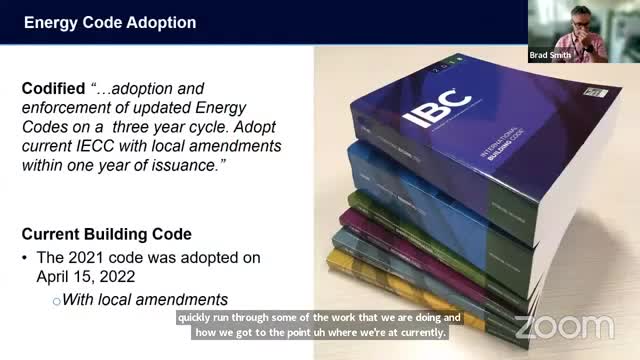Fort Collins targets zero carbon buildings by 2030
July 10, 2024 | Energy Office, State Agencies, Organizations, Executive, Colorado

This article was created by AI summarizing key points discussed. AI makes mistakes, so for full details and context, please refer to the video of the full meeting. Please report any errors so we can fix them. Report an error »

In a recent government meeting, officials from the City of Fort Collins outlined significant advancements in their energy conservation efforts, emphasizing the adoption and enforcement of updated energy codes. The city has committed to aligning its building regulations with the International Energy Conservation Code, with local amendments, on a three-year cycle. As of April 15, 2022, Fort Collins is operating under the 2021 version of this code, which is integral to the city's climate action strategy.
The city has successfully exceeded its 2020 greenhouse gas emissions reduction target of 20%, achieving a slight surplus. However, officials expressed concern about meeting the next ambitious goal of an 80% reduction by 2030, forecasting a likely achievement of only 70%. This underscores the importance of every incremental effort in reaching the ultimate aim of carbon neutrality by 2050.
To facilitate this transition, Fort Collins has developed a \"climate future plan,\" which includes a focus on creating energy-efficient, emissions-free buildings. A key component of this plan is the introduction of a performance path for new construction, aimed at achieving zero carbon buildings by 2030. This approach is designed to provide flexibility for builders while ensuring transparency and measurable energy outcomes.
In a notable development, the city secured a federal grant of $45 million from the Department of Energy, part of the bipartisan infrastructure law, to advance building energy codes and efficiency policies. The grant application, submitted in March 2023, was awarded in July 2023, marking a significant milestone for the city. The funding will support the establishment of energy use intensity targets and carbon emission reduction goals, with a strong emphasis on equity and stakeholder engagement.
Fort Collins plans to implement a comprehensive methodology for assessing energy performance, utilizing data from its municipal utility. This will enable the city to track progress towards its energy targets and ensure compliance with the new codes. The initiative will also include the development of an implementation guide and training programs to support builders in meeting the new standards.
As Fort Collins moves forward with these ambitious plans, the collaboration with various partners, including the Florida Solar Energy Center and the New Buildings Institute, will be crucial in shaping the future of energy efficiency in the region.
The city has successfully exceeded its 2020 greenhouse gas emissions reduction target of 20%, achieving a slight surplus. However, officials expressed concern about meeting the next ambitious goal of an 80% reduction by 2030, forecasting a likely achievement of only 70%. This underscores the importance of every incremental effort in reaching the ultimate aim of carbon neutrality by 2050.
To facilitate this transition, Fort Collins has developed a \"climate future plan,\" which includes a focus on creating energy-efficient, emissions-free buildings. A key component of this plan is the introduction of a performance path for new construction, aimed at achieving zero carbon buildings by 2030. This approach is designed to provide flexibility for builders while ensuring transparency and measurable energy outcomes.
In a notable development, the city secured a federal grant of $45 million from the Department of Energy, part of the bipartisan infrastructure law, to advance building energy codes and efficiency policies. The grant application, submitted in March 2023, was awarded in July 2023, marking a significant milestone for the city. The funding will support the establishment of energy use intensity targets and carbon emission reduction goals, with a strong emphasis on equity and stakeholder engagement.
Fort Collins plans to implement a comprehensive methodology for assessing energy performance, utilizing data from its municipal utility. This will enable the city to track progress towards its energy targets and ensure compliance with the new codes. The initiative will also include the development of an implementation guide and training programs to support builders in meeting the new standards.
As Fort Collins moves forward with these ambitious plans, the collaboration with various partners, including the Florida Solar Energy Center and the New Buildings Institute, will be crucial in shaping the future of energy efficiency in the region.
View full meeting
This article is based on a recent meeting—watch the full video and explore the complete transcript for deeper insights into the discussion.
View full meeting
